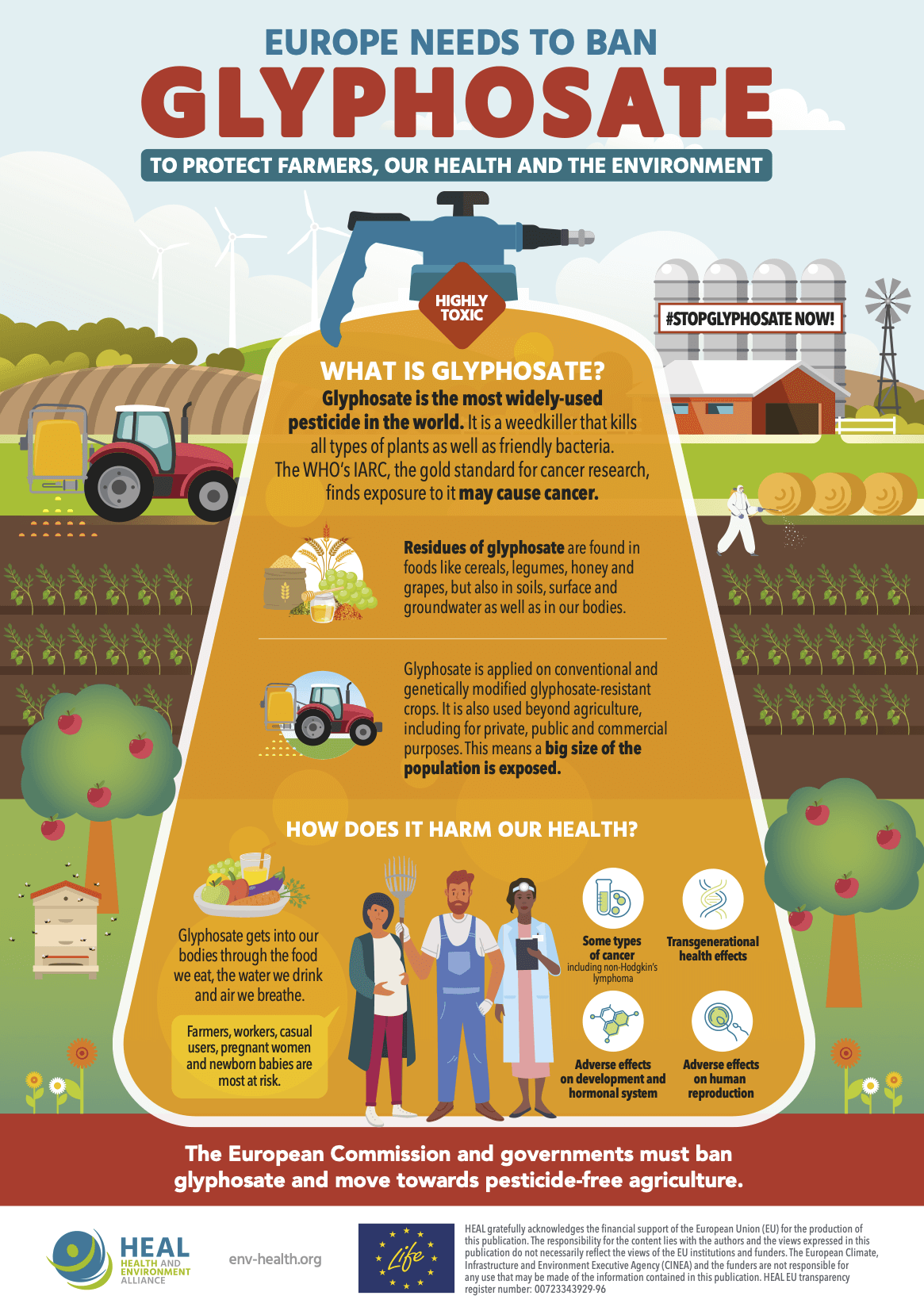- Are there any alternatives to glyphosate, and pesticides in general?
Contrary to claims made by the agrochemical industry, viable alternatives to herbicides exist. Organic farmers have successfully employed non-chemical methods for over 70 years. In this time, significant scientific progress has been made in developing and refining non-chemical weed management techniques. Moreover, the prohibition of synthetic herbicides in organic agriculture since the 1960s has resulted in the development of a wide range of specialized weeding machinery.
The use of herbicides, including glyphosate, can be significantly reduced, even eliminated in conventional agriculture. However, as a first step we have to question our approach of considering that all weeds in the crop fields are “pests” that need to be eradicated. In fact, about 80% of plants on the field do not need to be killed and can actually be beneficial to the farmer and food production systems. A successful and sustainable weed management requires the integration of a wide range of different methods. Measures have to be tailored to the type of weed, and the type of crop, usually applied in combination, at specific times of the life cycle of the crop. This approach is the basis of integrated weed management (IWM), where techniques such as crop rotation, mechanical weeding, biological control, and active monitoring are used to achieve optimum weed management and healthy, pesticide-free, quality crops with good yields.
The practices of weed management can be divided into four parts:
- Preventive and cultural agronomic practices
- Monitoring – observation and identification of weeds, assessment of potential value or harm
- Physical control
- Biological control
The foundation of weed management is based on preventive and cultural weed management techniques. All of these cultural techniques are preventive; they are not about controlling weeds that have already become established but rather prevent the weeds from establishing in the first place. These methods are used to maintain field conditions so that weeds are less likely to become established and/or increase in number or to strengthen the crops and facilitate them in competing with the weeds. Cultural weed control includes a wide range of practices such as:
- Crop rotation: changing crops seasonally to manage weeds by preventing the dominance of specific weed species. It works by suppressing weeds through the alternating growth of different crops with contrasting conditions for weed growth.
- Intercropping: growing two or more plants simultaneously in the same field so that the properties of each plant facilitate the growth of the other. It is useful in fighting weeds as it suppresses weed germination and growth through shading, allelopathy, competition for resources, and other interactions.
Direct physical weed control options are useful to fight established weeds. Farmers and growers can make use of the vast range of weeding machinery available (in-crop weed management) for weed management. Weeding machines can be differentiated by their modes of action, which are suitable for different needs. Amongst these machines, electrothermal weeders have a systemic mode of action similar to glyphosate; it can kill all types of plants, including those resistant to glyphosate. This method functions by applying high-voltage electricity to a plant's foliage. The electricity heats the water inside the plant to boiling point, causing the cells to burst and effectively killing the plant. It can replace herbicides in various agricultural applications, such as field preparation, crop desiccation, and targeted weed control. Ongoing research aims to enhance its efficiency and reduce the energy required for weed elimination.
Many other non-chemical methods are available to avoid the use of glyphosate, such as biological weed control, weed management by livestock, harvest seed control, mulching, and more. These alternatives offer both low and high-tech options that offer different advantages to farmers. However, it is vital to integrate various methods into non-chemical weed management because one method is rarely enough to manage all weeds at all times in all crops. Indeed, even with herbicide-based weed management, a range of different types of herbicide modes of action is required to achieve sufficient weed management across the whole farm.
According to Nicolas Munier-Jolain, coordinator at IPMWORKS, and a researcher at France’s Institute for Agriculture, Food and the Environment (INRAE), the data collected between 2020 and 2021 from European farms which have implemented IPM strategies demonstrates that it is possible to do without pesticides while maintaining economic activity.
If you're keen on learning more, a wealth of information can be found in the report titled: 'WEED MANAGEMENT: ALTERNATIVES TO THE USE OF GLYPHOSATE.' This report serves as a valuable and relevant resource for anyone interested in alternatives to glyphosate. It provides comprehensive information on the Integrated Pest Management (IPM) approach and the diverse range of weed management approaches available to achieve effective weed control without the use of herbicides.



